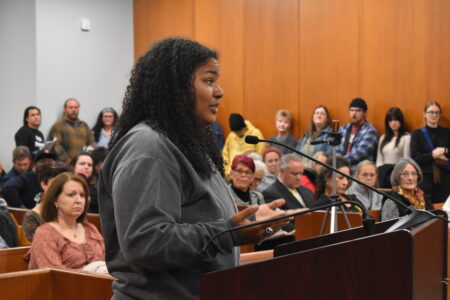Wheeling City Council Takes Heat Over Homeless Camp Closure

photo by: Eric Ayres
Ocean Smith of Wheeling, youth organizer for the American Civil Liberties Union of West Virginia, told city leaders in Wheeling Tuesday night that banishing homelessness from public view is not solving the problem.
WHEELING — Residents packed the second floor courtroom in the City-County Building on Tuesday night as Wheeling City Council held its first public meeting since voting to recommend the closure of its exempted homeless encampment.
Scores of demonstrators gathered outside across Chapline Street before the meeting to voice opposition to the city’s decision to close the camp on Dec. 1. The group then filed into the building, and many among them signed up to speak during the meeting.
A total of 30 speakers voiced their opinions, each allotted a maximum of three minutes to address council. Following their routine procedure, city leaders allowed members of the public to speak, but officials did not respond to what was said.
More than two-thirds of the speakers expressed opposition to the city’s looming action to close the camp located near the entrance of the Peninsula Cemetery, just north of the Interstate 70 overpass along Wheeling Creek.
A number of residents also spoke in favor of closing the encampment.
“Whatever it takes for us to come together to find some common ground, that’s what needs to happen,” said Mike Jaeger, a resident of the camp. “There’s nowhere else to go. If we live on the streets, we get locked up for vagrancy. I ask that you please try to work with us and find a solution.”
The parade of speakers voiced concerns earnestly and respectfully, many pleading with city leaders to work together with the community toward a viable solution that will help those who are less fortunate. Most of the speakers thanked city council for taking the time to listen to them.
“Very few see us as human,” said Jess Truex, also a resident of Wheeling’s homeless encampment. “Too many people have given up on us now. The only people we have on our side is supposed to be you guys.”
During the last city council meeting in September, all city council members with the exception of Councilman Ty Thorngate voted to recommend that City Manager Robert Herron take action to close the camp. Mayor Denny Magruder described the exempted camp as a “failure,” not only to the individuals who live there but also to the neighboring residents and local businesses impacted by the situation.
The day after the previous city council meeting, notices signed by the city manager were placed in the camp notifying residents that the encampment will be closed on Dec. 1.
Ocean Smith of Wheeling, youth organizer for the American Civil Liberties Union of West Virginia, said there are many facts and figures that show that this approach to homelessness is ineffective.
“My hope is that, should this happen to you all, you’d find a community that cared and you’d find the resources and the conditions you need to survive,” Smith said. “That’s the hope you’re robbing from our unhoused friends and neighbors — survival.”
Opponents of the camp’s closure disputed the assertion that there were enough shelter beds to accommodate the city’s homeless population. They also expressed disbelief that this action would be taken at the beginning of winter, leaving scores of individuals displaced during the coldest months of the year.
“Put yourself in their shoes for a second — when you have no home, no money, no transportation, and no options,” Smith said. “Sleeping has been deemed a crime. It’s been deemed a criminal act. Homelessness is not solved by banishing the problem from public view.”
Abrielle Struthers, who also lives in the homeless camp, said that because of her substance abuse and mental health issues, she had to give her family custody of her 10-year-old daughter.
“The camp is currently the only place I have to live,” Struthers said. “It’s safer for us to be in the camp. Being out on the street alone is not safe at all. Being in the camp where there are males around is safer for us.”
Some homeless individuals acknowledged that they needed to keep the camp cleaner and that there are some people there — although certainly not all — who cause problems.
“But kicking us out of the camp isn’t going to solve anything,” Struthers said. “It’s going to give us nowhere to go. We’ve failed ourselves in so many ways, but it’s just one more failure to add to it if you kick us out of the camp and give us no other option – with nowhere to go.
Mark Phillips, president and CEO of Catholic Charities West Virginia, said the homeless issue is one of the many community issues the organization tackles across the region — and it is a growing one.
“I wish Catholic Charities had a solution for this,” Phillips said. “We’re working in 20 cities across West Virginia on a wide variety of programs. Homelessness is just a small part of what we do. It may be an increasing part because we’ve been asked to do it and try to find a way to help.
“There are ways to do this with compassion and caring.”
Phillips said Wheeling should be the kind of city that takes the lead on this issue with “values-based leadership that recognizes the inherent dignity of the people that are here.”
Outreach workers said there are around 70 people in Wheeling’s homeless camp at latest count. The Life Hub’s low-barrier shelter is typically filled to capacity already, they noted. The Salvation Army closed its shelter in Wheeling, and there are a limited number of beds and other barriers in a small handful of other available shelters locally.
Outreach coordinator Kate Marshall, director of UPLIFT West Virginia and HoH Share Inc., said this move to close the camp will increase problems, not reduce them.
“People in crisis do not disappear, they just become more desperate,” Marshall said.
Advocates for the continuation of the homeless encampment said there are written rules posted at the camp, but no citations of those rules have been issued, yet the camp has been deemed a “failure.” The camp has been an exemption to the city’s relatively new camping ban, and language in the city’s ordinance allows for the inclusion of a managed camp – a concept that has never come to fruition with neither the city nor local service agencies agreeing to spearhead the management of a camp.
Duncan Waitts said homeless residents need an option for change instead of strictly survival.
“These things take time, but they take people with integrity to work with you guys to have a better result,” Waitts said. “Not just people who promise you false dreams. These guys have a dream of some day living in their own home again — not living in that camp forever. So as we stand here and say ‘let’s keep the camp open,’ let’s find them somewhere to really go that they can be proud of. It has to be more than just the camp.”
Councilman Ben Seidler interrupted the procession to applaud Waitts’ assertion that getting people out of the camps and into housing should be a priority.
“Duncan gets it. Listen to that man,” Seidler said. “I’ve heard one person so far talk about ‘let’s get these people sheltered or housed, or get them a bed somewhere’ instead of keeping this stupid camp open. People deserve dignity.”
Not all speakers opposed the closure of the homeless encampment. Wheeling’s Ward 3 Councilwoman Connie Cain — who during the previous city council meeting was the member who moved to recommend the camp’s closure — signed up to speak as a concerned citizen.
“I feel for the homeless, but at what point does the safety of the residents matter?” Cain asked. “East Wheeling has been a dumping ground for years.”
Cain, who resides in East Wheeling, said she has had numerous issues related to the presence of the camp nearby — from intruders in her house to people sleeping under her deck, attempted thefts, and constant trash and litter.
She said people in the camp are not all local. She said they come from “Steubenville, Beckley, Baltimore, Oregon, California” and other locations. She said she knows for a fact that some have had criminal charges and even a “murderer” from Texas had been living in a previous camp location.
“I’ve been out to the camp — nobody should be living like that,” Cain said. “It’s been two whole years. I have elderly people in East Wheeling, and they are scared to death. In the middle of the night, they’re coming to their houses. They’re knocking on their doors.
“Not everybody out there is an addict. Not everybody is a criminal, not everybody has a mental illness. At what point do we say, ‘people matter, businesses matter, and the residents matter?'”
Cain said no plan has materialized over the past two years that the camp has been open. She added that Youth Services System used to operate a homeless shelter for the winter, but no longer does. Catholic Charities had previously opened its ballroom at its facility on Main Street as a winter homeless shelter, but is no longer offering that space. The Salvation Army used to offer beds, but are now closed.
“But services are still going on,” Cain said.
Stan Stazenski of Wheeling said he sympathized with the homeless, but noted that Wheeling’s problem is bigger than it should be.
“Across America, the homeless rate is 1.75 for every 1,000 people, so that says we in Wheeling should have about 47 homeless people,” Stazenski said. “We’re way over the national average, so why? That’s one problem we’ve got to address.”
Revitalizing the drug task force is the way to battle a core source of the homeless dilemma, Stazenski noted.
“I’ve got grandparents that come down and say, ‘what happened to Wheeling? We can’t bring our grandkids down here anymore,'” he said, noting that many people are afraid to even use Heritage Trail in many areas – a feature of the city that used to be viewed as a true recreational asset for the city.
Mike Duplaga of Generations Restaurant and Pub thanked service agencies for their efforts, but noted that as a business owner in Fulton, he has a different perspective on the matter.
“If I have an event going on in my upstairs, I go open my banquet door to come in, I’ve got to deal with human feces,” Duplaga said, noting that homeless people rummage through trash, break into cars, ask customers for change and for leftovers, and even have been caught overdosing on drugs in their restroom during business hours.
“If it bothers my customers, it bothers me. I could go on and on,” he said.
Dr. Norman Wood of Cameron also spoke, noting that he has been trying to get a new state hospital open to address many of the issues associated with homelessness. Wood said he has dealt with the homeless population for many years and has worked extensively with those struggling with mental health and substance abuse issues.
“I applaud the city council’s decision in closing the homeless camp,” Wood said. “That is definitely a step in the right direction. Leaving them out in the freezing winter is not compassionate care, it is societal neglect.”
Wood said the city’s action will force people indoors. He said they will fight against it, but it is in their best interest.
“Those who are objecting – most of the people are good hearted,” Wood said. “They do not understand the situation and the pathologies involved. They are just very much misinformed. But the second type of people who will vigorously complain about closing this camp are the scammers and the fraudsters, and they are making money on the backs of the misery of these people who are stuck in this lifestyle.”





